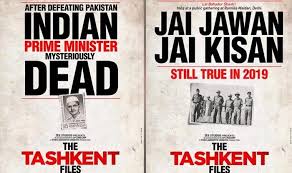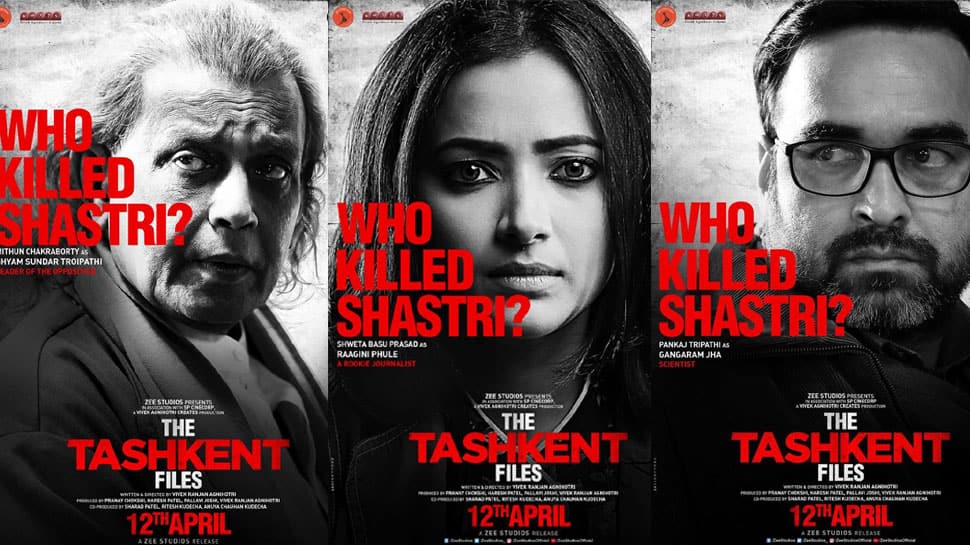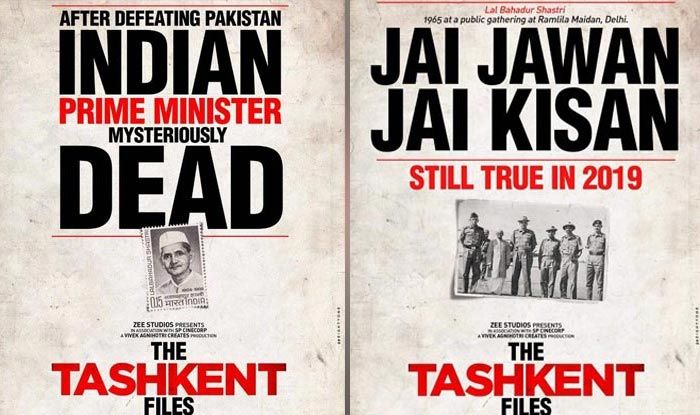The Tashkent Files: An Indian Movie about sudden death of PM Lal Bahadur Shastri in Uzbek capital in 1965

By Sharma Bawa.
Hindustan Times, 04/12/2019
The Tashkent Files
Cast: Shweta Basu Prasad, Naseeruddin Shah, Mithun Chakraborty
Director: Vivek Agnihotri
Rating: 1/5
‘Truth is a luxury’
12 angry men — correction, 6 men and 3 women but all very angry and not afraid to show it — sit down in a closed room to decide if former Prime Minister Lal Bahadur Shastri died of natural causes or whether he was murdered. Director Vivek Agnihotri picks his menagerie carefully; he is in maximum impact mode this election season, after all. There is a historian and a journalist, a judge and a woman with multiple NGOs on her CV, a former intelligence operative and a scientist, an industrialist and two politicians.
The above line about truth just about sums up what happens in the dimly lit room where fact and fiction are happily muddled up to serve you a concoction so lethal it can either send your blood pressure soaring or send you off to sleep. I would suggest the latter course in case you find yourself with a ticket of The Tashkent Files; it saves you a headache later.
Watch Tashkent Files trailer:

Tashkent, referring to the Uzbekistan capital — formerly a part of the USSR — is where India’s second prime minister died the day he signed an important treaty with Pakistan after the 1965 war. While officially his death is said to be due to a heart attack, conspiracy theories have suggested poisoning. Either Google it or watch The Tashkent Files – every whack-a-doodle conspiracy theory finds a play at both.

To take a stab at the film’ story, thin as it is, a low-on-scruples journalist Ragini (Shweta Basu Prasad) gets a call from a Deep Throat who is a big fan of Kaun Banega Crorepati. After playing fastest-fingers-first with her on the phone, he sends her a ‘super secret dossier’ on PM Shastri’s death. There are no Pentagon Papers inside, only every theory or RTI query that is already out there on the internet.

Ragini gets her scoop but the political machinations are already underway. A manipulative home minister (Naseeruddin Shah) sets up a committee to look into her claims and heading it is Tripathi (Mithun Chakrobarty), a politician looking for ‘mudda’ for the next elections. What happens next is best summed up by Naseer’s crooked leader, “Only idiots are afraid of the truth. One should be scared of rumours because if they are not stopped, they become such irrefutable truth that even the truth starts looking like lies.” We, the audience, get all kinds of rumours – said at a high octave over and over again. Inside this committee room, nobody speaks, they shout. Instead of conversation, they deliver declamatory speeches. The closer we get to the climax, the shriller the tone becomes. To make sure the theories have a facsimile of truth, statements made by PM Shastri’s family members – wife Lalita, Anil Shastri and Sunil Shastri – are referenced; works of his press secretary Kuldip Nayar and journalist Anuj Dhar are mentioned.

The Tashkent Files is a propaganda film primarily and makes no bones to hide the fact. Mithun’s character seems to be talking for the director when he calls historians “liberal terrorists”, NGOs “social terrorists”, judges “judicial terrorists” and media “TRP terrorists”. While “presstitutes”, “liberal siculars” and “war of narratives” crawl out of social media onto the big screen in this film, the choicest of shots are saved for the Congress and Indira Gandhi. Emergency is alluded to repeatedly and claims made by KGB archivist Vasili Mitrokhin about the agency paying bribes to an unnamed senior leader and her cohorts run as a scroll. The director claims India was colonised again in the 70s and it would have never happened if Shastri was still at the helm. While Indira Gandhi is never mentioned by name, the references are too blunt to be ignored.
Political propaganda is not the worst of its sins, alas. A communal speech by Pankaj Tripathi’s character is painful to watch; he warns of a certain community poisoning the entire country and attacking India with its army. He is shut down but the harm has been done. “Maine itni zyaada gandgi ek saath isse pehle kabhi nahi dekhi,” he is told. If this film ever needs an epitaph, this is it.
- Previous Southeast Asia wary on China, Belt and Road initiative: Survey
- Next Prime Minister Narendra Modi gets Russia’s top honour for promoting bilateral ties
















